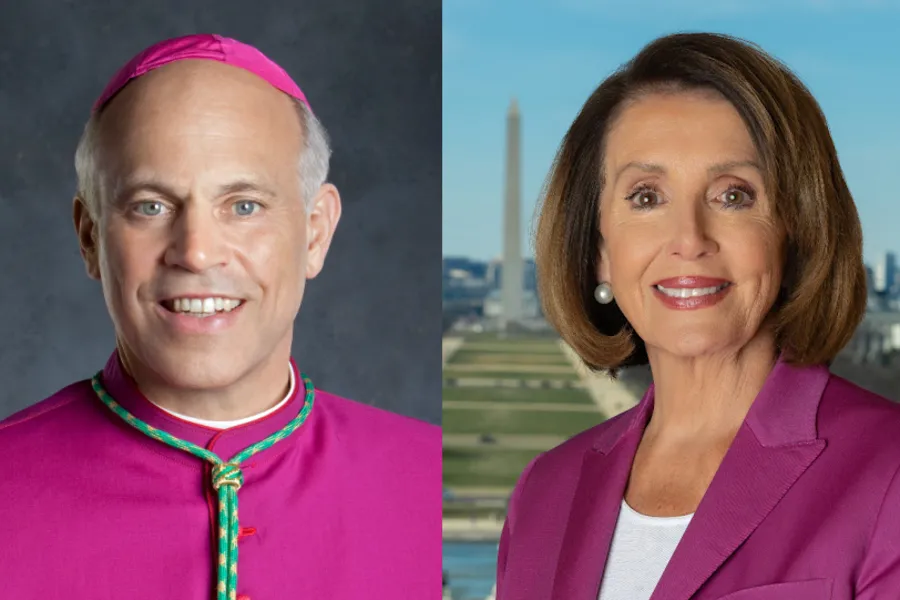Archbishop Cordileone Raises Issue of Excommunication for Abortion Advocates
In op-ed, Archbishop Salvatore Cordileone draws a parallel between the abortion politics of today and institutional support of segregation and other forms of racial injustice in the United States in the mid-20th century.

Calling abortion “the most pressing human-rights challenge of our time,” Archbishop Salvatore Cordileone on Sunday invoked the excommunication of prominent Catholic segregationists in the early 1960s as an example of a legitimate response to pro-abortion Catholics politicians who support “a great moral evil.”
In an op-ed published in The Washington Post, the leader of the Archdiocese of San Francisco pushed back against recent statements by Catholic politicians who have denounced a new state law in Texas that prohibits abortions after six weeks of pregnancy.
The op-ed doesn’t mention any politicians by name, and it stops short of advocating that any specific pro-abortion politicians be excommunicated. President Joseph Biden and House Speaker Nancy Pelosi, both professed Catholics, have been among those who have come out strongly against the Texas law.
In the op-ed, Archbishop Cordileone draws a parallel between the abortion politics of today and institutional support of segregation and other forms of racial injustice in the United States in the mid-20th century.
He specifically cited the example of New Orleans Archbishop Joseph Rummel, who refused to remain silent about the racial injustice that corrupted American society in his day.
“Rummel did not ‘stay in his lane.’ Unlike several other bishops throughout this country’s history, he did not prioritize keeping parishioners and the public happy above advancing racial justice,” Archbishop Cordileone wrote.
“Instead, he began a long, patient campaign of moral suasion to change the opinions of pro-segregation White Catholics.”
Rummel’s campaign included admitting two Black students to New Orleans’ Notre Dame Seminary in 1948. Three years later, he ordered the removal of “white” and “colored” signs from Catholic churches in his archdiocese. In 1953, he ordered an end to segregation in the archdiocese, and he formally integrated New Orleans’ Catholic schools in 1962.
“Many White Catholics were furious at this disruption of the long-entrenched segregationist status quo,” Archbishop Cordileone wrote.
“They staged protests and boycotts. Rummel patiently sent letters urging a conversion of heart, but he was also willing to threaten opponents of desegregation with excommunication,” he continued.
“On April 16, 1962, he followed through, excommunicating a former judge, a well-known writer and a segregationist community organizer. Two of the three later repented and died Catholics in good standing,” he wrote.
“Was that wrong? Was that weaponizing the Eucharist?” Archbishop Cordileone asked in the op-ed. “No. Rummel recognized that prominent, high-profile public advocacy for racism was scandalous: It violated core Catholic teachings and basic principles of justice, and also led others to sin.”
Archbishop Cordileone noted that Texas is providing $100 million to fund pregnancy centers, adoption agencies and maternity homes while also providing mothers who want to keep their babies with free counseling, parenting help, diapers, formula and job training.
“You cannot be a good Catholic and support expanding a government-approved right to kill innocent human beings. The answer to crisis pregnancies is not violence but love, for both mother and child,” he wrote.
“This is hardly inappropriate for a pastor to say,” Archbishop Cordileone concluded. “If anything, Catholic political leaders’ response to the situation in Texas highlights the need for us to say it all the louder.”
- Keywords:
- archbishop salvatore cordileone
- abortion
- pro-abortion politicians
- pro-abortion catholic politicians

















